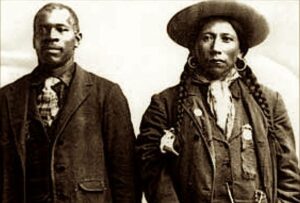 There are those advocating, once again, that reparations be paid to Americans who are black because of slavery early on in our country's history.
There are those advocating, once again, that reparations be paid to Americans who are black because of slavery early on in our country's history.
To hear some speak about it you would almost believe that America had actually invented slavery.
Sorry, but those who believe reparations should be paid are either: 1) completely uninformed regarding world history and culture, or, 2) forwarding a very specific and hidden agenda. Or, both.
Of course, politicians forwarding this absurdity fall into category number two, though they may also be totally ignorant on the subject of the history of slavery.
Here are just a few salient facts.
Slavery and indentured or forced servitude had been an accepted and common practice throughout almost all of human culture for thousands of years prior to America even coming into existence.
Encyclopedia Britannica suggests that slavery most likely began at the time of the Neolithic Revolution, around 11,000 years ago, or 110 centuries.
That is about 105 centuries before Europeans ventured across the Atlantic Ocean to what would eventually come to be known as North America.
It is historically documented that slavery was a part of many African societies and their economic structure for centuries prior to colonists settling in the "new world." For instance, in West Africa's Mali, during the 14th century, the number of slaves a person owned reflected their social standing.
Another pertinent fact: virtually all races, not just blacks, have been subject to this barbaric practice.
There are countless examples of where slavery has existed around the world, including, but not limited to: Babylonia, Ancient China, Ancient Egypt, Ancient Greece, Ancient Iran, the Arab Islamic Caliphate and Sulanate, the Roman Empire, Africa, Arabia, Europe, India and North, Central and South America - i.e., North American Indian tribes, the Mayans, the Incans, the Aztecs, etc.

Black Slave - Indian Owner
An interesting note: prior to white Europeans arriving on what is now known as the North American continent, slavery and the slave trade were nearly universally practiced among the Native Indian tribes. That includes - as had also been done in other times and countries - using women and children to pay off, of all things, gambling debts.
The point is, at some point in time almost every country had slavery as part of their common, every day life.
And, yes, there are still countries today with slaves, not to mention international human and child trafficking (with many ending up as sex slaves).
Yet, one of the first countries that ended thousands of years of this practice must pay reparations?
Who are you kidding?
Perhaps this is a primary reason to erase or alter history. If no one knows what occurred in the past, anything can be said under the guise of being true. Where factual history is known, however, the lies are exposed for what they are, fiction.
Truth be told, not all black people in America were slaves. As well, there were a large number of Irish who, upon arriving in the Colonies, became indentured servants, following what had been practiced in all the British territories around the world.
Another truth is that there were black slave owners in the colonies, some of whom had both black and white people as slaves. An early one was Anthony Johnson, a successful tobacco farmer, who obtained his first indentured servant for life, a black man, by court order in 1654.
Did some of our Founders own slaves? Yes, but many of them also led the drive to abolish slavery.
The Slave Trade Act of 1794 was signed into law by President George Washington that limited American involvement in the international slave trade.
 In 1806 President Thomas Jefferson called for the end of the slave trade in his 1806 State of the Union address. The 9th Congress of the United States made the importation of slaves illegal in 1807, becoming effective January 1, 1808.
In 1806 President Thomas Jefferson called for the end of the slave trade in his 1806 State of the Union address. The 9th Congress of the United States made the importation of slaves illegal in 1807, becoming effective January 1, 1808.
Yes, there continued to be struggles. America is not perfect. Nor is any other country. When you consider that our Founders were dealing with 11,000 years of cultural history and practice, they did pretty well.
The final acts against slavery for America followed the Civil War, when the 13th, 14th and 15th Amendments were passed between 1865-1870.
Thus, the barbarism of slavery that had spanned 110 centuries was ended in the United States once and for all.
It would seem, to someone who knows the gruesome and long history of slavery throughout the world, that if one were going after reparations, one would go to the place where it started, not try to force those who ended it to pay for something that was inherited from human culture and was a very common and accepted practice throughout time.
Our Declaration of Independence spelled it out: We hold these truths to be self-evident, that all men are created equal, that they are endowed by their Creator with certain unalienable Rights, that among these are Life, Liberty and the pursuit of Happiness.
Our U.S. Constitution protects those rights of all Citizens, no matter the race or gender.
In America, like no other country, the opportunity to succeed exists for anyone who wishes to work for it. The key, of course, is working for it.
Our rights as Americans are unequalled anywhere, at any time, on Earth. But that has been changing. And, We the People have allowed it.
 We did not heed the words of our Founders concerning those we elect. Perhaps Sons of Liberty founder Samuel Adams said it best, If ever the Time should come, when vain & aspiring Men shall possess the highest Seats in Government, our Country will stand in Need of its experienced Patriots to prevent its Ruin.
We did not heed the words of our Founders concerning those we elect. Perhaps Sons of Liberty founder Samuel Adams said it best, If ever the Time should come, when vain & aspiring Men shall possess the highest Seats in Government, our Country will stand in Need of its experienced Patriots to prevent its Ruin.
We have, indeed, allowed too many vain and aspiring people in government who have, bit by bit, taken away some of our freedoms, straddled us with monumental debt, and more to be sure, while they became millionaires being a public servant.
The only real way to safeguard our freedoms, our liberty, our unalienable rights, is to know and understand our Supreme Law of the Land and how our country should be operating and then to make certain that it does operate in that manner.
Along with that, We the People must ensure our family members and friends are also armed with this same ammunition (information) - knowledge of our precious U.S. Constitution.
Learning the basics is easy. Pick up a copy (or stream) the award-winning In Search of Liberty Constitution movie. It is a great refresher or educational tool. Following the movie, check out the more in-depth study offered by Building Blocks for Liberty in their three-hour Constitution Boot Camp Streaming Home Edition or consider Constitutional attorney KrisAnne Hall's online Liberty First University. There are also many free resources available at U.S. Constitution. Perhaps you and the family would like a fun, week-long constitutional getaway. Check out Camp Constitution’s 2021 Family Camp in New Hampshire, Sunday, July 18 to Friday, July 23.
Know your rights. Defend your rights.
by Scott D. Welch, Patriot
Direct descendant of 8 Americans who fought in the Revolutionary War
Cousin of Patrick Henry

